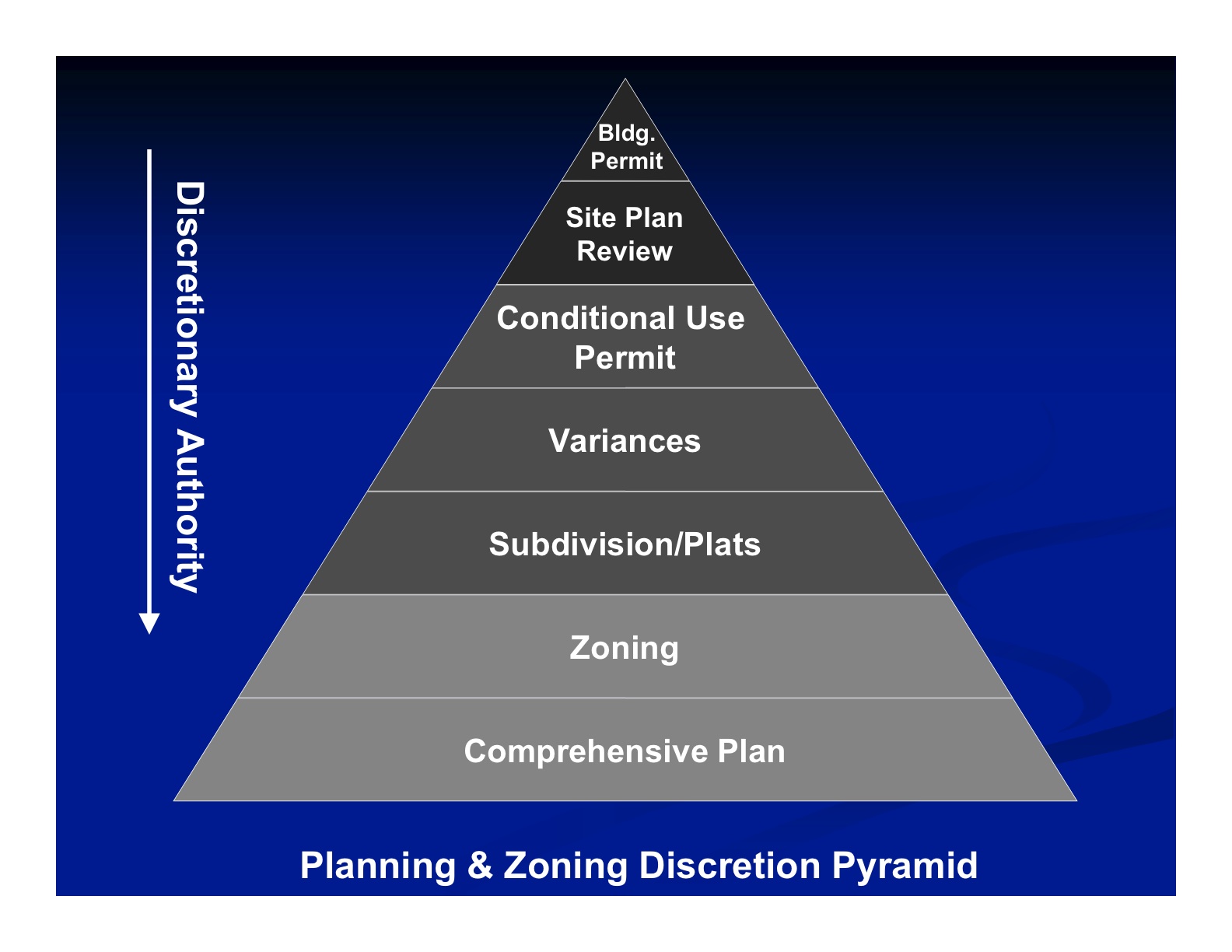As I discussed in
my last entry, if we go to court in the CoPar suit, a judge will determine whether the city, exercising quasi-judicial authority, was arbitrary, unreasonable or capricious in deciding not to approve CoPar's conditional use permit application.
Many people who look at the CoPar situation wonder how the city's decision in September 2006 could possibly be called arbitrary, unreasonable, or capricious. The R-1(R) zoning requires lots at least 2 acres in size; CoPar's proposal had smaller lots; therefore it was turned down because it did not comply with the zoning regulations. What's the matter with expecting people to follow the rules? And why would the developer think they could build more houses on that land in the first place?
The problem is that Maplewood's zoning and our comprehensive plan on this parcel do not agree with one another -- and in Minnesota, the comprehensive plan trumps zoning.
The Conflict
First of all, the problems with Maplewood's
comp plan. The southern portion of CoPar's property is guided as "R-1."
On page 30 of the Comp Plan, we are told, "Table 5 (on page 33) shows the maximum number of people per gross acre allowed . . . If someone wants to know how many units of a certain type of dwelling they can build, they should use Table 5." Unfortunately, Table 5 on page 33 does not specifically mention the R-1 land use category. It does say that, for "Single Dwelling," the city expects 2.9 people per unit. It also seems to cross reference "Single Dwelling" with the R-3L and R-3M land uses for 4.1 and 4.6 units per acre, respectively -- but those are multiple dwelling land uses. This makes no sense. Maybe it means that R-1 can have up to 4.1 or 4.6 units per acre, if there are some kind of headers missing from the right columns of the table that would clarify what they mean?
On page 32 of the comp plan, there is a much more clear listing of the land use categories. Under residential land use, it specifies that R-1 means "Single Dwelling (10,000-square-foot lot areas)." In other words, roughly 4.3 units per acre.
The Residential Land Uses has three categories of "Residential Estate" uses (RE-20, RE-30, and RE-40), that do specify larger lots (of 20/30/40 thousand square feet each, respectively). If larger lots were intended, why wasn't the land guided as one of these?
Also the R-1(R) zoning ordinance mentions land where municipal sanitary sewer and water service are not foreseen, thus requiring larger lots for septic systems. If a developer is willing to install sewer and water, are the large lots still necessary, given that the comp plan allows for higher densities under the R-1 land use?
So we appear to have a problem between the comp plan (lots as small as 10,000 square feet) and zoning (lots no less than 2 acres, or 87,120 square feet) on this parcel. Which can the developer -- or the neighboring residents -- rely on?
The Law
Unfortunately for Maplewood, the law is quite clear: If there's a disagreement between the Comp Plan and the zoning controls, the comp plan wins.
In several places, the
Metropolitan Land Use Planning Act suggests that the Comprehensive Plan outranks zoning and other official controls. For example:
473.865 ADOPTION; CONFLICTS, AMENDMENT OF CONTROLS, DEVICES.
Subdivision 1. Control copies to [met] council. Each local governmental unit shall adopt official controls as described in its adopted comprehensive plan and shall submit copies of the official controls to the council within 30 days following adoption thereof, for information purposes only.
Subd. 2. No conflict with plans. A local governmental unit shall not adopt any official control or fiscal device which is in conflict with its comprehensive plan or which permits activity in conflict with metropolitan system plans.
Subd. 3. Amendments. If an official control conflicts with a comprehensive plan as the result of an amendment to the plan, the official control shall be amended by the unit within nine months following the amendment to the plan so as to not conflict with the amended comprehensive plan.
In
Metropolitics: A Regional Agenda for Community and Stability (Brookings Institution Press, 1997), former Minnesota legislator Myron Orfield discusses the Metropolitan Land Use Planning Act, which he actually introduced. He writes (p. 126):
In terms of enforcement, the Land Planning Act provided explicit authority for both the Met Council and interested citizens to sue to ensure that the Development Guide was followed. It reversed the so-called "Merriam Amendment," which had given local zoning laws precedence over comprehensive plans.
The language of the statute can be confusing sometimes to those of us who are not lawyers, but I think Mr. Orfield's words cut through the legalese of the Act to make his intent as its author clear. He intended to reverse the Merriam Amendment, and to give comprehensive plans precedence over zoning.
Usually developers have been on the other side of this issue in their lawsuits (as in
Mendota Golf, LLP v. City of Mendota Heights, when the zoning was
less restrictive than the comp plan; the developer sued to force the city to change the comp plan to match the zoning, and the Minnesota Supreme Court sided with the city). Developers know very well to look at the comp plan first, and property lawyers
advise their clients to "
rely only on the comprehensive plan’s use designation."The Impact for Our Case
At the Planning Commission public hearing and in e-mails from residents since then, I've heard many folks who oppose the development asking that we go to court and trust that the judge will rule in our favor. Perhaps, some have suggested, this will be the test case to overturn the rule of comp plan over zoning.
If we go to court and hope to win, I think we need to be very clear on what we will be trying to persuade the judge to do. We not only will ask her to overturn precedents from previous court cases. We will want her to overturn the law itself, or somehow interpret it in a way directly contrary to the explicit intent of the legislators who wrote it.
While I'm not a lawyer, it seems to me that this is a pretty slim hope on which to pin the future of this land that our community values so highly.
Labels: development, process



